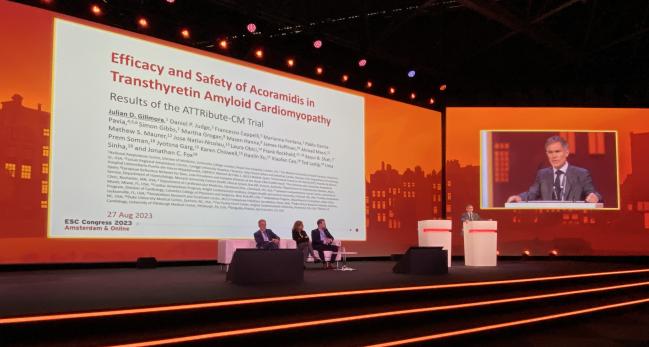More Details on Acoramidis’ Benefit in ATTR Cardiomyopathy: ATTRibute-CM
Experts hope the drug is approved and acts as a competitor to an existing, and expensive, treatment for ATTR-CM.

AMSTERDAM, the Netherlands—Top-line results of ATTRibute-CM were already known, but a new Hot Line presentation at the European Society of Cardiology (ESC) Congress 2023 delivered more information about the safety and efficacy of acoramidis (BridgeBio), an investigational agent for the treatment of transthyretin amyloid cardiomyopathy (ATTR-CM).
As reported by TCTMD in July, treatment with acoramidis 800 mg twice daily improved the hierarchical primary composite endpoint of all-cause mortality, cardiovascular hospitalizations, change from baseline in NT-proBNP, and change from baseline in 6-minute walk distance at 30 months when compared with placebo (win ratio 1.77; 95% CI 1.42-2.22).
“Remarkably, the overall survival and cardiovascular hospitalization rates approached that of age-matched populations without ATTR-cardiomyopathy,” said lead investigator Julian Gillmore, MD, PhD (University College London/Royal Free Hospital, England), during an ESC press conference announcing the results.
ATTRibute-CM included 632 patients (mean age 77 years; approximately 90% male) with diagnosed ATTR-CM and NYHA class I-III symptoms. In terms of cardiovascular hospitalizations, a component of the primary endpoint, treatment with acoramidis led to a relative 50% reduction in risk. Key secondary endpoints also showed a consistent benefit with acoramidis across multiple measures of disease activity, including NT-proBNP levels, exercise tolerance, quality of life, and serum transthyretin (TTR) levels, the protein central to ATTR-CM, said Gillmore.
Thibaud Damy, MD, PhD (University Hospital Henri Mondor, Creteil, France), the discussant following the ESC presentation, homed in on all-cause mortality, noting that the reduction was not statistically significant. In the ATTR-ACT trial, tafamidis (Vyndaqel and Vyndamax; Pfizer), the first drug ever approved for ATTR-CM, significantly reduced all-cause mortality.
“How to explain the discrepancy between the two drugs and two trials?” asked Damy. For him, there are differences in the patient populations, he said, noting that while acoramidis-treated patients in ATTRibute-CM were older than those in ATTR-ACT, they weren’t as sick. For example, a larger percentage had NYHA class I/II heart failure, and baseline NT-proBNP levels were also higher. This is reflected in the all-cause mortality rates of the placebo-treated patients in ATTRibute-CM and ATTR-ACT: 29.5% versus 42.9%, respectively.
Importantly, there were also differences in background treatment that could have impacted mortality, said Damy. As part of the study protocol, which was mandated from an ethical perspective, all randomized patients could be treated with tafamidis at 12 months at the discretion of the treating physician. Overall, 14.5% of the acoramidis-treated patients and 21.8% in the placebo arm received tafamidis.
Responding, Gillmore said the absence a significant effect on all-cause mortality alone “is entirely consistent with the change in population since the ATTR-ACT study was run.” He noted that even the survival rate among placebo-treated patients in ATTRibute-CM was higher than that seen among tafamidis-treated patients in ATTR-ACT. “It’s not at all surprising given the reduced number of events that mortality alone wasn’t statistically significant,” he said. “What is important is that the trend in mortality was in the right direction.”
Gillmore also believes the addition of tafamidis likely diluted the treatment effect of acoramidis. He noted that the combined endpoint of all-cause mortality and cardiovascular hospitalizations was significantly reduced in ATTRibute-CM. Despite the use of tafamidis in ATTRibute-CM, he doesn’t envision both agents being used together, but rather as competing drugs.
Access to Treatment Is a Problem
ATTR-CM is a “progressive and fatal disease” caused by deposits of transthyretin amyloid fibrils into the myocardium, said Gillmore. It is an inherited autosomal dominant trait caused by mutations in the TTR gene or by deposits of wild-type transthyretin proteins and is believed to affect more than 400,000 patients around the world. Acoramidis is a potent and highly selective oral stabilizer of the TTR protein.
Although considered a rare disease, Gillmore said improvements in cardiovascular imaging, along with the development of treatments, have led to an “upsurge” in the diagnosis of ATTR-CM. “We don’t know the true prevalence,” he told TCTMD. “We might still be at the tip of the iceberg.”
Tafamidis was approved in the United States in 2019 on the basis on ATTR-ACT and is also approved in Canada, the United Arab Emirates, Japan, Brazil, and Europe. However, with a $225,000 USD price tag, tafamidis ranks as the most expensive CV drug on the market, outraging some physicians who accused Pfizer of price gouging.
“A lot of patients have no access to the treatment,” said Damy during the Hot Line session.
To TCTMD, Gillmore pointed out that the drop-in use of tafamidis was on the low side because it’s not widely available, mainly because of its cost. In the UK, the National Institute for Health and Care Excellence (NICE) recommends against its use for the treatment of ATTR-CM. “To be honest, what’s going on in the UK is representative of many countries,” he said, adding that he hopes the emergence of a competing drug brings its list price down.
Faiez Zannad, MD (University of Lorraine, Nancy, France), who moderated the ESC Hot Line session, said that a head-to-head trial between tafamidis and acoramidis is unlikely, but physicians will want to know how the drugs stack up against each other. He asked Gillmore what advice he’d give to those who care for patients with this rare cardiomyopathy.
“My advice would be that it would be great to have two possible drugs that we could give,” said Gillmore. “The data from this trial, certainly the improvements suggested by these data in 6-minute walk test and NT-proBNP, we may actually be seeing genuine clinical improvements with acoramidis.”
Gillmore added that the manufacturer is expected to file for US Food and Drug Administration approval later this year and will seek approval in other countries in 2024. He is hopeful regulators approve acoramidis. “I think this drug ought to be made available on the basis of the results of this trial,” he said. As a doctor who has taken care of patients with amyloidosis for 30 years, he said that with the emergence of acoramidis, along with tafamidis, “it’s been amazing to see the benefits of these drugs on patients.”
Michael O’Riordan is the Managing Editor for TCTMD. He completed his undergraduate degrees at Queen’s University in Kingston, ON, and…
Read Full BioSources
Gillmore JD, Judge DP, Cappelli F, et al. Efficacy and safety of acoramidis in transthyretin amyloid cardiomyopathy. Presented at: ESC 2023. Amsterdam, the Netherlands. August 27, 2023.
Disclosures
- Gillmore reports consulting for Bridgebio, Alnylam, Ionis, AstraZeneca, Intellia, Pfizer, ATTRalus, and Lycia.





Comments